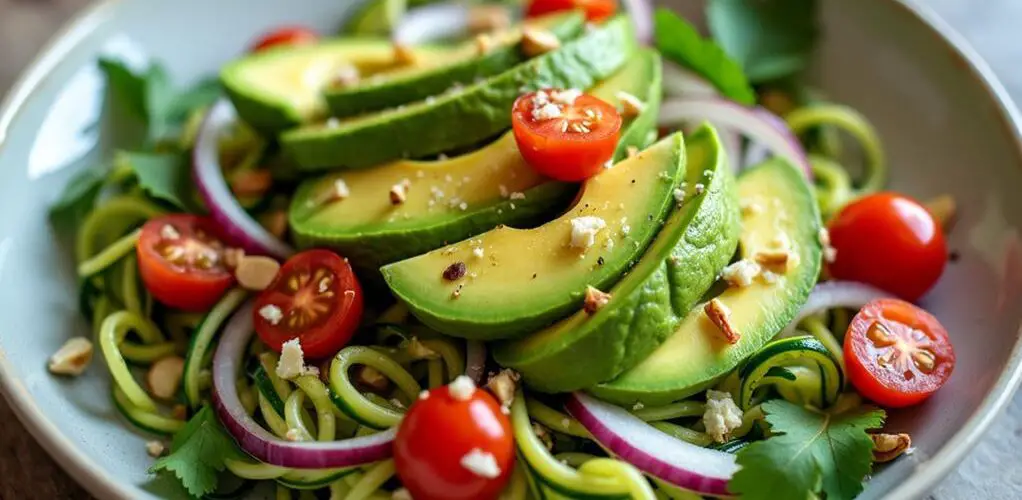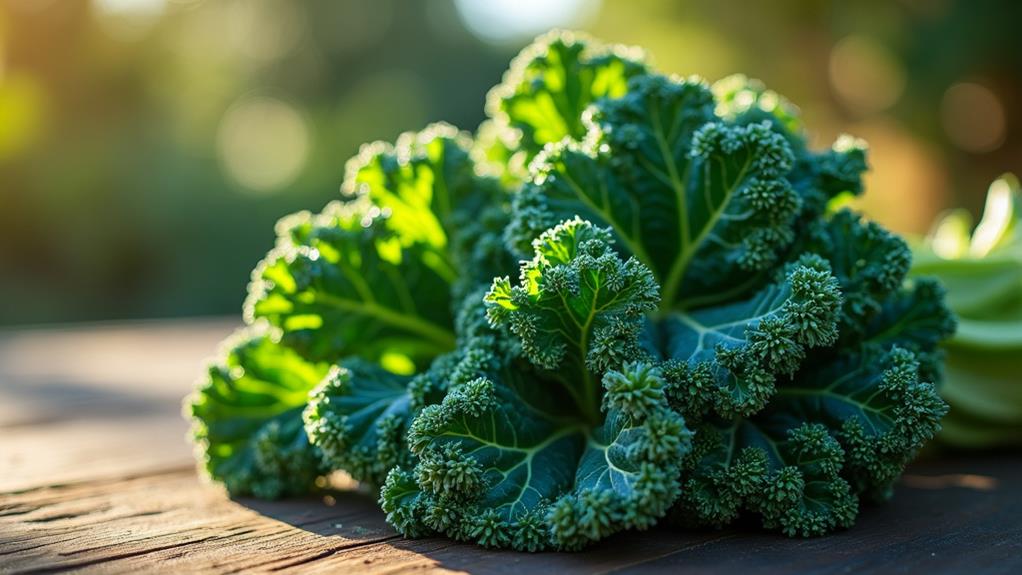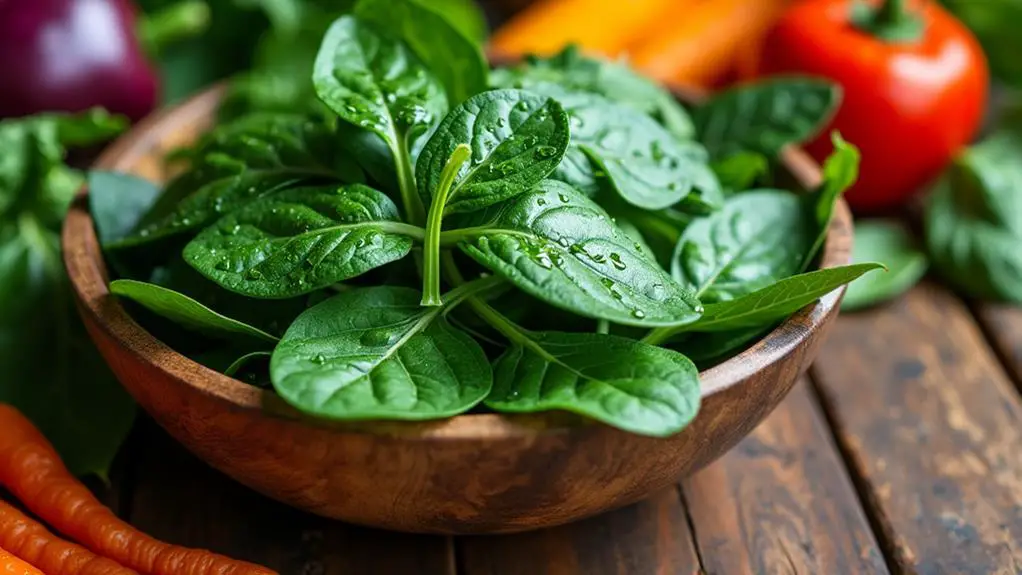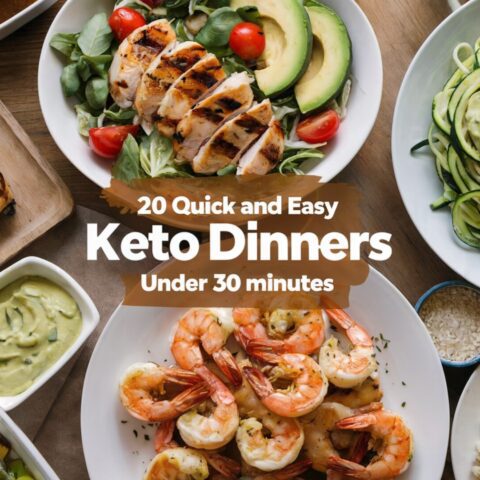
Maintaining a ketogenic diet can be deliciously diverse with keto-friendly vegetables like arugula, asparagus, bell peppers, broccoli, Brussels sprouts, cauliflower, kale, mushrooms, spinach, and tomatoes. These vegetables are low in carbohydrates yet high in fiber, vitamins, minerals, and antioxidants, which support overall health and keep you full longer. They can be enjoyed raw, roasted, steamed, or sautéed, adding both nutritional value and culinary flexibility to your meals. Including these vegetables in your diet promotes digestive health, weight management, and might reduce the risk of chronic diseases. Discover how to incorporate these versatile vegetables into your keto lifestyle.
Key Takeaways
- Arugula, asparagus, bell peppers, broccoli, and Brussels sprouts are keto-friendly vegetables with low carbohydrate content.
- Cauliflower, kale, mushrooms, spinach, and tomatoes provide essential vitamins and minerals while fitting into a ketogenic diet.
- Most of these vegetables are high in fiber, promoting digestive health and satiety.
- Vegetables like broccoli and tomatoes are rich in antioxidants, helping reduce inflammation and risk of chronic diseases.
- These vegetables can be prepared in numerous ways, including roasting, steaming, grilling, and raw consumption.
Arugula
Incorporating arugula into a ketogenic diet can be a strategic choice for maintaining low carbohydrate intake while benefiting from essential nutrients. Arugula contains approximately 3 grams of carbohydrates per 4-cup serving, making it an ideal leafy green for those adhering to a keto regimen. This nutrient-dense vegetable is rich in calcium, vitamins A and C, and a variety of antioxidants, which collectively support overall health.
Additionally, arugula is low in calories, with only 20 calories per 4-cup serving. One of the key arugula benefits is its high fiber content, which aids digestion and promotes a feeling of fullness without adding unnecessary carbs.
The peppery flavor of arugula can also enhance various dishes, making it a versatile ingredient in keto-friendly recipes. For example, an arugula salad with olive oil, avocado, and grilled chicken provides a nutritious and satisfying meal. Additionally, arugula can be used to top keto sandwiches or as a fresh component in omelets.
Incorporating arugula into meals not only supports the goals of a ketogenic diet but also contributes to a balanced intake of essential vitamins and minerals. For practical arugula recipes, consider adding it to soups, stews, and even low-carb pizzas to maximize both flavor and nutritional value.
Asparagus
Moving from arugula to another keto-friendly vegetable, asparagus stands out as an excellent choice for those adhering to a low-carb diet. With only 2 grams of carbohydrates per four cooked spears, asparagus is a nutrient-dense option that fits seamlessly into ketogenic meal plans.
Rich in vitamins A, C, E, and K, asparagus provides essential nutrients while remaining low in calories. These vitamins contribute to various health benefits, including improved vision, enhanced immune function, and better skin health. Additionally, asparagus is high in fiber, which supports digestive health and helps maintain satiety—an important factor for those on low-carb diets.
Asparagus can also be paired with healthy oils like olive oil to enhance its flavor and nutritional profile.
The asparagus benefits extend beyond its nutritional profile. This vegetable is packed with antioxidants, which may help reduce the risk of chronic diseases and support overall health. Moreover, asparagus has been linked to improved sleep quality and reduced stress levels, making it a multifaceted addition to any diet.
For those looking to incorporate asparagus into their meals, numerous asparagus recipes can be explored. Whether grilled, steamed, or roasted, asparagus offers versatility and can be paired with various keto-friendly ingredients to create delicious, health-promoting dishes.
Bell Peppers
Bell Peppers
Bell peppers are an excellent low-carb option for the keto diet, with only 7 grams of carbohydrates per medium pepper. They are nutrient-rich, offering more than 150% of the daily recommended intake of vitamin C, along with antioxidants and anti-inflammatory properties that support overall health.
The Mediterranean diet often incorporates bell peppers due to their versatility and health benefits. Their versatility in culinary applications—whether raw in salads, stuffed, or roasted—makes them a valuable addition to keto-friendly meals.
Nutrient-Rich, Low Carbs
Among the myriad of vegetables suitable for a ketogenic diet, bell peppers stand out as a nutrient-rich, low-carb option. With only approximately 7 grams of carbohydrates per medium pepper, they fit seamlessly into a keto meal plan. Their fiber content, while modest, can aid in digestion and help maintain satiety, making them a practical choice for those seeking to manage their carbohydrate intake.
Bell peppers are particularly notable for their high vitamin C content, providing over 150% of the daily recommended intake in just one medium pepper. This makes them not only low-carb but also highly nutritious.
For those engaged in meal prep, bell peppers are highly versatile and can be incorporated into a variety of dishes. They can be enjoyed raw in salads, adding a crisp texture and vibrant color, or roasted to bring out their natural sweetness. Additionally, stuffed bell peppers offer a creative and filling keto-friendly meal option.
At only about 24 calories per medium pepper, bell peppers are also beneficial for weight management. Their low-calorie profile, combined with their nutrient density, makes them an excellent addition to any keto diet.
Antioxidant Properties
Packed with vibrant colors, bell peppers are not just a culinary delight but also a powerhouse of antioxidants. Rich in vitamin C, a single medium-sized bell pepper provides approximately 152% of the daily recommended intake, making it an exceptional source of this critical nutrient. This high vitamin C content helps combat oxidative stress and supports the immune system, delivering considerable antioxidant benefits.
Bell peppers also boast various phytochemicals, including carotenoids and flavonoids, which are known for their anti-inflammatory properties. These compounds may reduce the risk of chronic diseases and promote overall health. Regular dietary inclusion of bell peppers can meaningfully enhance the body's antioxidant status, leading to improved health outcomes and potentially preventing age-related damage.
| Nutrient | Amount in Bell Pepper | Daily Recommended Intake (%) |
|---|---|---|
| Vitamin C | 152% | 152% |
| Carotenoids | High | N/A |
| Flavonoids | Present | N/A |
| Antioxidant Status | Enhanced | N/A |
Furthermore, the antioxidant properties of bell peppers may contribute to better skin health, offering protection against oxidative damage and aging. Including bell peppers in a keto-friendly diet provides a flavorful way to boost antioxidant intake and support overall well-being.
Versatile Culinary Uses
In addition to their impressive antioxidant properties, bell peppers shine in the culinary world due to their versatility and low carbohydrate content, making them a staple in keto-friendly diets. Containing approximately 7 grams of carbohydrates per medium pepper, they fit seamlessly into various low-carb meal plans without compromising nutritional value.
Bell peppers come in a spectrum of colors, each offering unique flavor profiles and nutritional benefits. Red peppers, for example, are the sweetest and richest in vitamin C.
This versatility extends to their culinary applications. They can be sliced and consumed raw for a crunchy snack, incorporated into stir-fries for added texture, or blended into sauces to enhance flavor without noticeably increasing carb counts.
A popular keto-friendly preparation is stuffed peppers. These can be filled with a mix of ground meats, cheeses, and low-carb vegetables, providing a satisfying and nutrient-rich meal.
Additionally, roasted varieties of bell peppers offer a depth of flavor that complements salads, grilled dishes, and soups.
Whether grilled, sautéed, or used as a colorful addition to salads, bell peppers contribute both flavor and essential nutrients to a keto diet, making them an indispensable ingredient for those seeking health-conscious culinary options.
Broccoli
Broccoli is a nutrient-dense powerhouse, containing approximately 8 grams of carbohydrates per medium stalk, making it an excellent low-carb choice for a keto diet.
Rich in vitamins C, K, and folic acid, as well as high in fiber, broccoli supports immune function, digestive health, and satiety.
Additionally, its antioxidants and flavonoids may help reduce the risk of chronic diseases, offering substantial health benefits.
Nutrient-Dense Powerhouse
For those adhering to a keto diet, broccoli emerges as a nutrient-dense powerhouse that seamlessly fits within low-carb parameters. Containing approximately 8 grams of carbohydrates per medium stalk, broccoli aligns well with the restrictive carbohydrate limits of a ketogenic regimen. This cruciferous vegetable is not only low in carbs but also rich in essential nutrients, including vitamins C, K, and folate, which are vital for immune function and bone health.
A significant advantage of incorporating broccoli into a keto diet is its high fiber content. With about 2.4 grams of fiber per cup, broccoli aids in digestion and promotes a feeling of fullness, which is beneficial for effective weight management. Furthermore, the fiber content helps maintain stable blood sugar levels, a critical aspect of any ketogenic meal plan.
Broccoli also boasts potent detoxification benefits. The vegetable is abundant in glucosinolates, compounds that enhance the body's detoxification processes, potentially reducing the risk of chronic diseases.
Additionally, the antioxidants present, such as sulforaphane, help combat inflammation and oxidative stress. These qualities make broccoli an excellent choice for those seeking to maximize the health benefits of their ketogenic diet.
Health Benefits
While recognizing broccoli as a nutrient-dense powerhouse is important, its specific health benefits deserve a closer examination. One of the key advantages of incorporating broccoli into a keto diet is its role in immune support. Rich in vitamins C and K, broccoli fortifies the immune system and enhances bone health.
Vitamin C is vital for the production and function of white blood cells, which are essential for combating infections, while vitamin K aids in bone mineralization and blood clotting.
Broccoli also excels in promoting digestive health due to its high fiber content. Fiber not only aids in maintaining regular bowel movements but also helps in sustaining a feeling of fullness, which can be particularly beneficial for those following a restrictive diet like keto. This can help manage hunger and reduce overeating.
Moreover, broccoli is packed with antioxidants such as sulforaphane, which have been shown to reduce the risk of chronic diseases by neutralizing harmful free radicals in the body.
Additionally, the phytochemicals in broccoli enhance the body's detoxification processes, helping to eliminate toxins more efficiently. These extensive health benefits make broccoli an exemplary vegetable for those pursuing keto-friendly nutrition.
Brussels Sprouts

Brussels sprouts are a nutrient-dense vegetable that fits seamlessly into a keto diet due to their low carbohydrate content and high fiber levels. One cup of Brussels sprouts contains approximately 8 grams of carbohydrates, making them an excellent choice for those adhering to a ketogenic lifestyle. They are also a powerhouse of nutritional value, rich in vitamins C and K, which are essential for immune function and bone health, respectively.
Additionally, Brussels sprouts contain anti-inflammatory properties that can help reduce chronic inflammation in older adults.
When it comes to cooking techniques, Brussels sprouts offer versatility that can enhance any keto meal. Roasting Brussels sprouts is a popular method that brings out their natural sweetness and creates a crispy texture, making them a delicious addition to your diet.
Sautéing is another effective technique that retains their nutritional benefits while adding a delightful flavor and tender texture. Steaming is a quick and efficient method that preserves their nutrients and can be a great base for salads or side dishes.
Incorporating Brussels sprouts into your keto meal plan can also improve gut health due to their high fiber content, aiding in digestion. Their antioxidant properties further contribute to reducing inflammation and lowering the risk of chronic diseases, making them a valuable component of a balanced keto diet.
Cauliflower
Cauliflower is an exceptional choice for those adhering to a ketogenic diet, given its minimal carbohydrate content, with only 4 grams per cooked cup. This makes it an ideal low-carb vegetable for maintaining ketosis. Cauliflower benefits are vast, not only due to its low carbohydrate count but also because of its versatility in the kitchen. Additionally, leafy greens are another great option for keto enthusiasts.
A rich source of vitamins C and K, cauliflower supports immune function and bone health, making it a nutritious addition to any diet. Its high fiber content aids digestion and helps maintain satiety, which is particularly beneficial for those on a low-carb regimen.
Additionally, cauliflower contains antioxidants and glucosinolates, compounds linked to potential cancer-fighting properties.
The adaptability of cauliflower allows it to substitute high-carb foods in various dishes. Popular cauliflower recipes include cauliflower rice, which can replace traditional rice, and cauliflower mash, a low-carb alternative to mashed potatoes.
These substitutions enable individuals on a ketogenic diet to enjoy their favorite meals without compromising their dietary goals. Incorporating cauliflower into your keto meal plan can provide both nutritional and culinary advantages, making it a staple for those committed to a low-carb lifestyle.
Kale

Kale stands out as a nutrient-dense powerhouse with less than 1 gram of carbohydrates per cup, making it an ideal low-carb super green for a keto diet.
Rich in vitamins A, C, and K, as well as antioxidants, kale supports immune function, skin health, and bone health while reducing inflammation.
Its versatility allows it to be incorporated into various dishes, from raw salads to sautéed sides and smoothies, ensuring it fits seamlessly into diverse meal plans.
Due to its low fiber content, kale can be easily combined with other keto-friendly vegetables to help maintain digestive health.
Nutrient-Dense Powerhouse
Among the myriad of vegetables suitable for a ketogenic diet, kale stands out as a nutrient-dense powerhouse. With less than 1 gram of carbohydrates per cup, kale is an ideal choice for maintaining ketosis. This leafy green is packed with essential vitamins, including A, C, and K, which support immune function, skin health, and bone health.
| Nutrient | Benefit | Recommended Use |
|---|---|---|
| Vitamin A | Supports vision and immune function | Add to salads or smoothies |
| Vitamin C | Promotes skin health and antioxidant defense | Use in kale recipes like soups or stir-fries |
| Vitamin K | Essential for bone health and blood clotting | Incorporate into cooked dishes |
Kale is also rich in antioxidants, which combat oxidative stress and may lower the risk of chronic diseases. As a good source of fiber, kale supports digestive health, promoting regularity and a feeling of fullness, which can aid in weight management. The versatility of kale makes it easy to incorporate into a variety of dishes. Whether you are making salads, smoothies, or cooked meals, kale recipes can enhance your nutrient intake and add flavor to your keto diet.
Incorporating kale into your meals not only diversifies your nutrient intake but also provides practical health benefits, making it an invaluable addition to any ketogenic lifestyle.
Low-Carb Super Green
A cornerstone of any ketogenic diet, low-carb super greens like kale provide an exceptional balance of minimal carbohydrates and maximal nutrients. Containing less than 1 gram of carbohydrates per cup, kale is an excellent choice for maintaining low carb intake on a keto diet.
It's rich in vitamins A, C, and K, which are essential for supporting overall health and immune function. Additionally, the high antioxidant content in kale can help reduce inflammation and lower the risk of chronic diseases, making it a potent ally in long-term health management.
Kale benefits extend beyond its nutrient profile; it is also high in fiber, aiding digestion and promoting satiety, which can be particularly beneficial for weight management on a keto diet.
The versatility of kale recipes adds to its appeal, as it can be incorporated into salads, smoothies, or prepared as a roasted or sautéed side dish. This adaptability not only makes meal planning easier but also guarantees that you can enjoy a variety of flavors and textures, preventing dietary monotony.
Incorporating kale into your ketogenic regimen is a practical and healthful decision, leveraging its impressive nutrient density and low-carb profile.
Versatile Cooking Options
The adaptability of kale in the kitchen underscores its value in a ketogenic diet, allowing for a wide range of culinary applications. One of the simplest kale recipes is incorporating it raw into salads. This method not only provides a satisfying crunch but also delivers a nutrient boost with less than 1 gram of carbohydrates per cup, rich in vitamins A, C, and K.
For those who prefer cooked vegetables, sautéing is an excellent cooking technique. Sautéed kale retains its nutritional value while becoming tender, making it a delicious addition to stir-fries or a standalone side dish. This method enhances meals without notably increasing carb intake.
Kale chips represent another versatile option. By tossing kale leaves with olive oil and seasoning before baking, you can create a crispy, low-carb snack alternative to traditional potato chips. This preparation method maintains the low-carb profile while offering a satisfying crunch.
Additionally, blending kale into smoothies can introduce a nutrient-dense element with minimal carbs. Its mild flavor complements fruits, adding fiber and antioxidants.
Lastly, adding kale to soups in the final minutes of cooking preserves its texture and nutrients, enriching the dish without adding considerable carbohydrates.
These versatile cooking techniques highlight the ease of incorporating kale into a keto-friendly diet.
Mushrooms
Mushrooms, with their mere 2 grams of carbohydrates per serving, present an excellent low-carb option fitting seamlessly into a keto diet. Various mushroom varieties such as button, cremini, portobello, and shiitake each offer unique flavors and textures, enhancing a wide range of dishes.
These fungi are not only low in carbs but also rich in B vitamins like riboflavin and niacin, which are vital for energy production and metabolic health. Additionally, mushrooms provide essential amino acids that aid in muscle maintenance and recovery, making them a valuable addition to your diet.
Cooking techniques for mushrooms are diverse and straightforward, making them a versatile ingredient in keto-friendly meals. Sautéing mushrooms in olive oil or butter enhances their natural umami flavor, while grilling can add a smoky depth, perfect for salads or as a side dish.
Their meaty texture also makes them an excellent meat substitute in recipes, providing a nutritious and satisfying alternative.
Additionally, mushrooms are a good source of essential minerals such as copper and selenium, which support antioxidant defense and immune function. Their high water content guarantees they remain low in calories, making them a filling yet non-fattening food choice.
Incorporating mushrooms into your keto diet can therefore raise both the nutritional value and flavor profile of your meals.
Spinach

Frequently lauded for its nutritional profile, spinach is an exceptional choice for those adhering to a keto diet, containing only 1 gram of carbohydrates per cup. This leafy green is packed with essential nutrients, including vitamins A, C, K, iron, and magnesium, making it a powerhouse for overall health.
The spinach benefits extend beyond its nutrient density, as it is also high in antioxidants which can help reduce inflammation and promote heart health. Additionally, spinach can contribute to improved metabolic health and insulin management, vital for those on a ketogenic diet.
Spinach is particularly advantageous for keto dieters due to its high fiber content, which aids digestion and contributes to a feeling of fullness, assisting with weight management.
Here are some practical ways to incorporate spinach into your keto meal plan:
- Salads: Fresh spinach leaves can be the base of a nutrient-dense salad, paired with other low-carb vegetables and a high-fat dressing.
- Smoothies: Blend spinach with keto-friendly ingredients like avocado and coconut milk for a nutritious, low-carb smoothie.
- Cooked Dishes: Add spinach to omelets, stir-fries, or soups to enhance flavor and nutritional value.
- Snacks: Create spinach chips by baking spinach leaves with olive oil and seasoning for a crunchy, low-carb snack.
Implementing these spinach recipes can help you maximize the spinach benefits while staying within your carb limits on a keto diet.
Tomatoes
Although often mistaken for a vegetable, tomatoes are technically a fruit and are a valuable addition to a keto diet due to their low carbohydrate content. Varieties such as cherry tomatoes contain less than 1 gram of carbs per tomato, while Italian tomatoes have approximately 2.33 grams of carbs per 100 grams, making them suitable for maintaining ketosis.
Tomatoes are rich in essential vitamins, particularly vitamin C, and contain lycopene, an antioxidant that may support heart health and reduce the risk of certain cancers. Additionally, their high water content aids in hydration, making them a revitalizing component in various dishes.
Incorporating tomatoes into a keto diet is straightforward due to their versatility. They can be consumed raw in salads, offering a crisp texture and vibrant flavor, or cooked using various methods such as roasting, grilling, or sautéing. Cooking methods can enhance the flavor profile and nutrient availability of tomatoes, further benefiting your diet.
It's important to remember that while tomatoes are low in carbs, certain nuts like cashews and peanuts might not fit well into a keto plan.
While tomatoes have a slightly higher carb content compared to other non-starchy vegetables, their nutritional benefits and flexibility in meal preparation make them a worthwhile inclusion in moderation. By balancing tomato varieties and cooking methods, you can enjoy their health benefits without exceeding your daily carb limits.
Frequently Asked Questions
What Vegetables Can I Eat on Keto?
For low carb options on a keto diet, consider vegetables like spinach, kale, and broccoli. These vegetables offer significant health benefits, including essential nutrients and fiber, while maintaining minimal carbohydrate content, supporting effective keto adherence.
What Vegetables Are off Limits for Keto?
Keto vegetable restrictions include high carb vegetables such as sweet potatoes, green peas, corn, white potatoes, and beets. These vegetables contain significant carbohydrate content, which can disrupt ketosis and should be avoided or limited on a ketogenic diet.
What Are the Top 10 Keto Foods?
The top 10 keto foods include avocados, eggs, cheese, fatty fish, nuts, seeds, olive oil, coconut oil, keto snacks like pork rinds, and low carb fruits such as berries. These items are nutrient-dense and low in carbohydrates.
What Can I Eat Unlimited on Keto?
In keto meal planning, you can consume unlimited low-carb snacks like leafy greens, mushrooms, asparagus, and celery. These vegetables are nutrient-dense and low in net carbs, making them ideal for maintaining ketosis while promoting overall health.
Conclusion
In summary, incorporating keto-friendly vegetables such as arugula, asparagus, bell peppers, broccoli, Brussels sprouts, kale, mushrooms, spinach, and tomatoes can greatly enhance a low-carbohydrate diet. These vegetables provide essential nutrients, fiber, and antioxidants while maintaining low carbohydrate content. Including these options in daily meals supports overall health and aligns with the ketogenic dietary framework, promoting effective weight management and metabolic benefits. Adopting these vegetables guarantees a balanced and nutritious approach to ketogenic eating.










No Comments